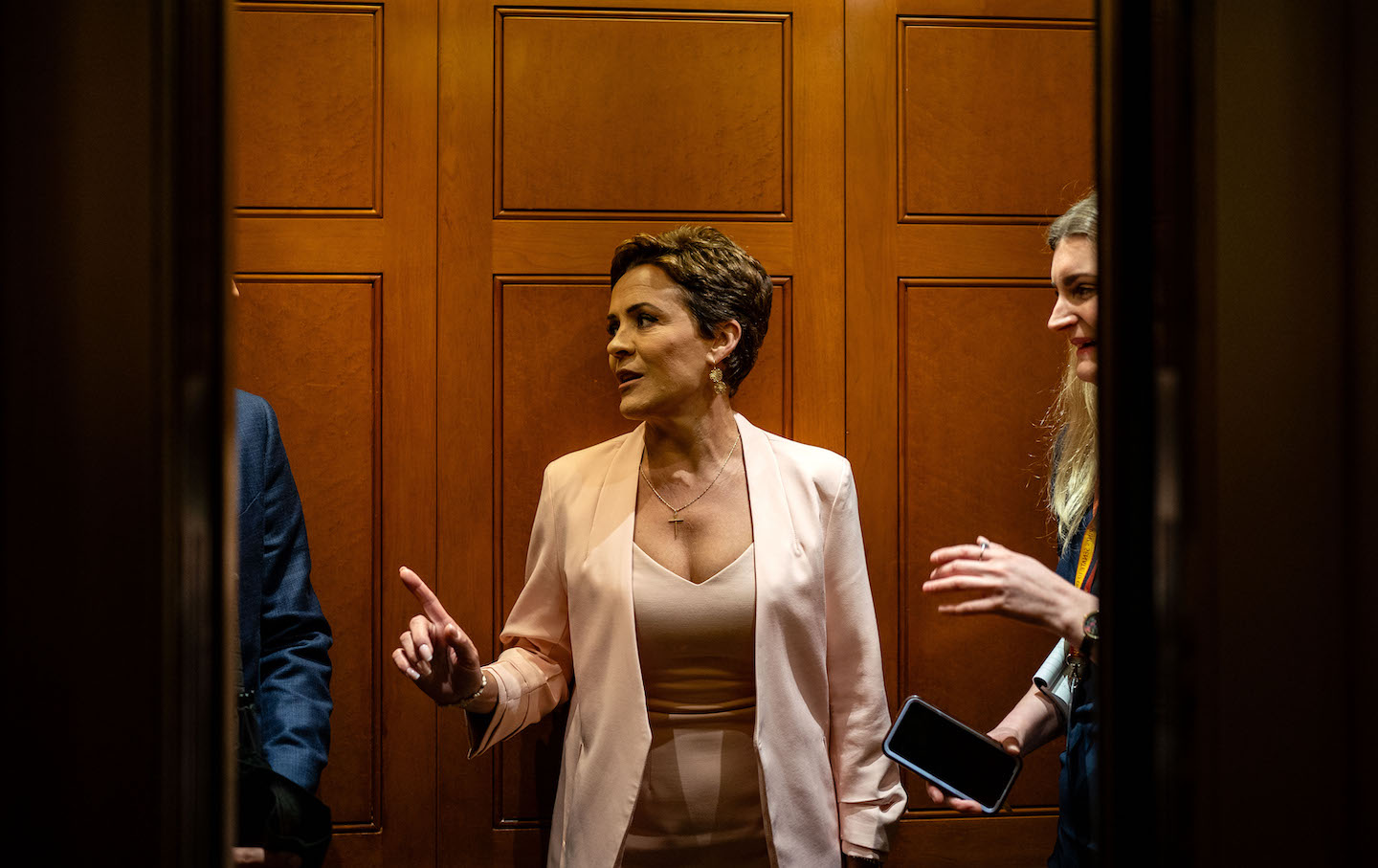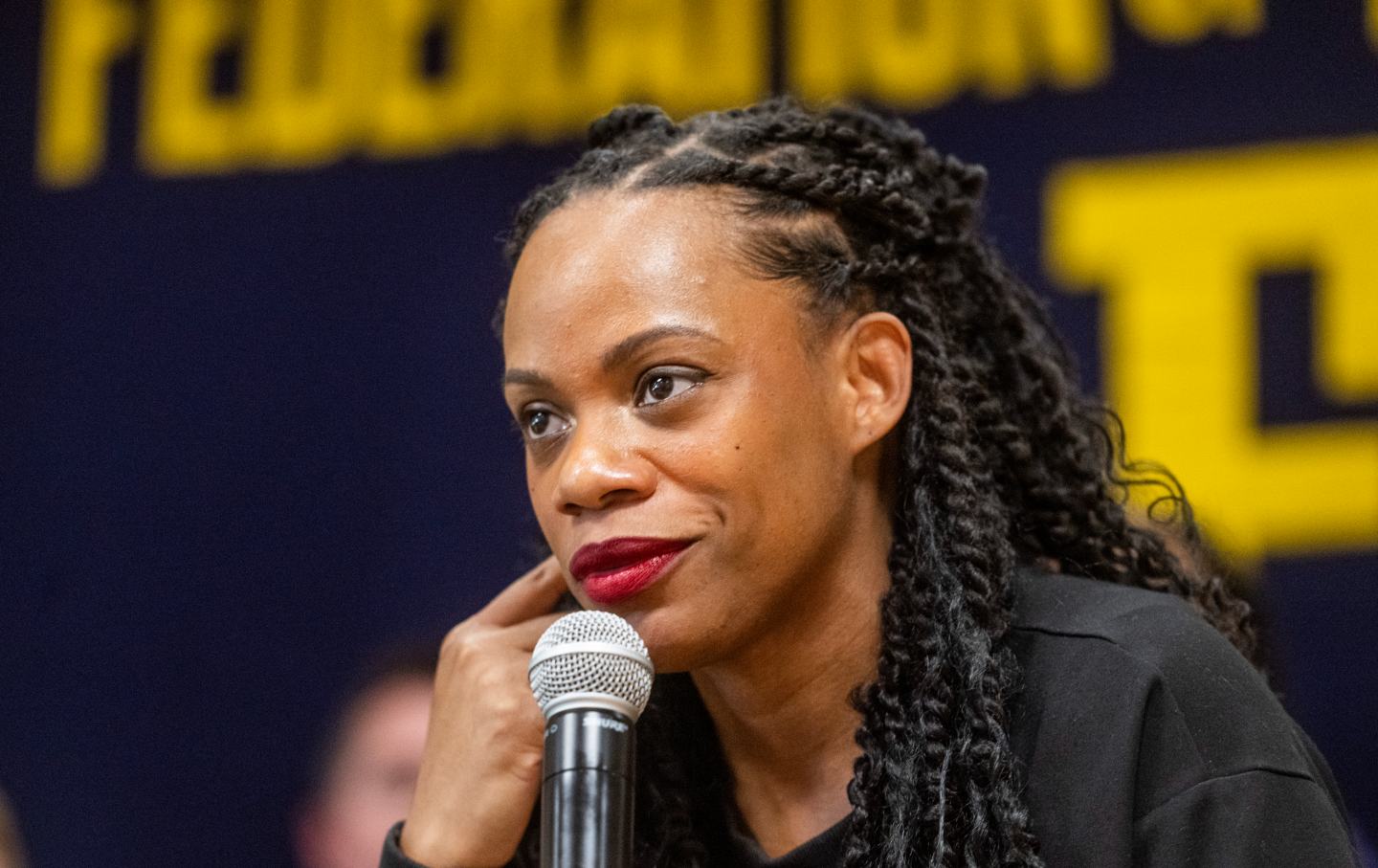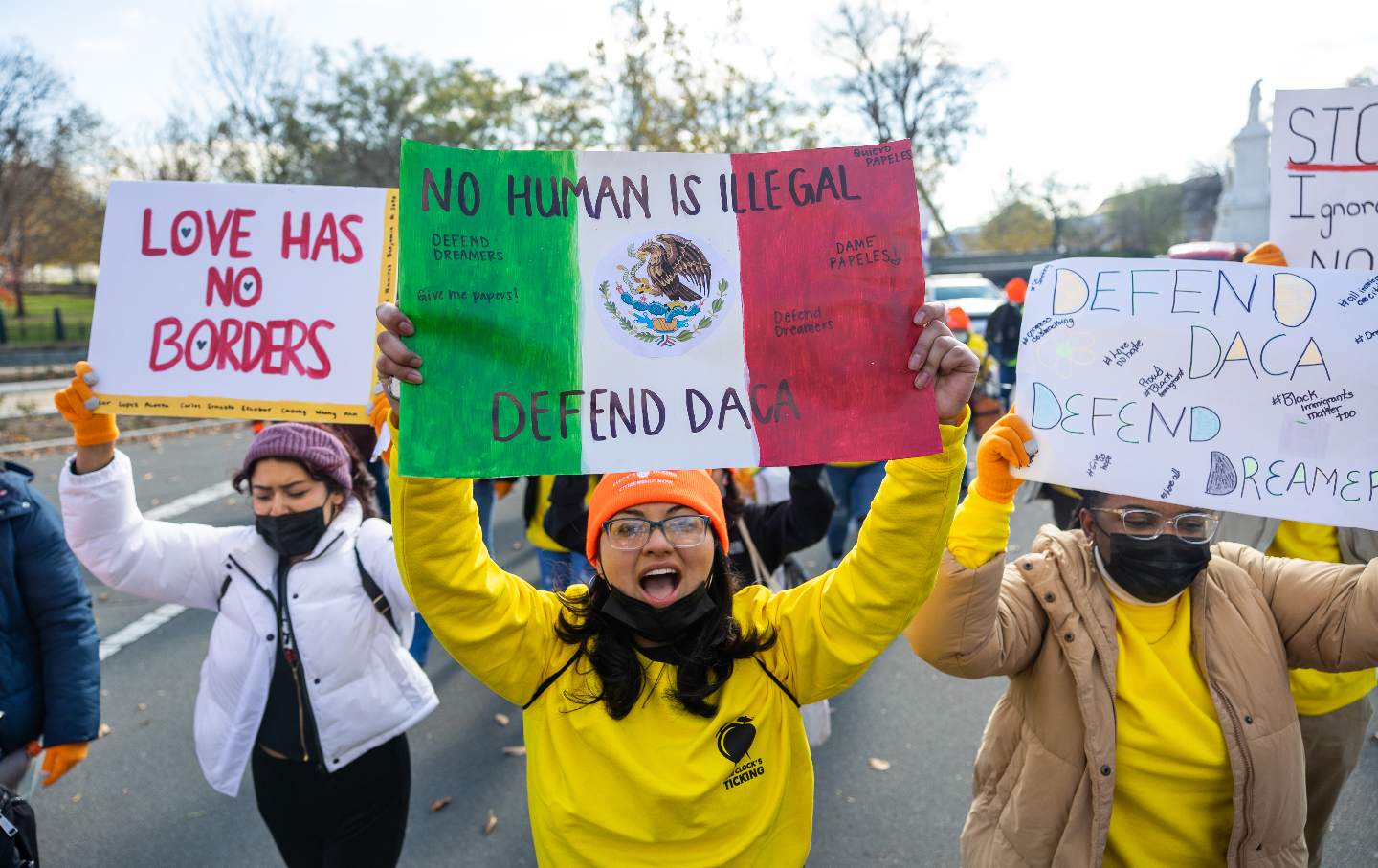A Statement From Jewish Americans Opposing AIPAC
“We will support candidates who are opposed by AIPAC, and who are advocates for peace and a new, just US policy toward Israel/Palestine.”

Secretary of State Antony Blinken (L) is welcomed to the stage by American Israel Public Affairs Committee (AIPAC) President Michael Tuchin during the committee’s annual policy summit Grand Hyatt on June 05, 2023, in Washington, D.C.
(Chip Somodevilla / Getty Images)For decades, the American Israel Public Affairs Committee (or AIPAC) has been the most powerful wing of the Israel lobby in the United States. Until recently, it enjoyed almost total support from politicians in both major political parties.
In the past few years, though, attitudes within the Democratic Party towards Israel, Palestine, and AIPAC itself have begun to shift dramatically, threatening AIPAC’s lobbying power. In response, AIPAC has begun aggressively intervening in Democratic primary elections, spending vast sums of money to defeat political candidates who might oppose the policies of the Israeli government. AIPAC recently boasted that it was “dollar for dollar, the largest contributor to candidates in the 2022 midterm elections,” and it has plans to spend even more money in 2024.
Much of AIPAC’s power and legitimacy derives from the idea that it broadly represents the views of American Jews. But Jews have never been a monolith, and, in the wake of Israel’s unrelenting assault on Gaza, more and more Jewish Americans are speaking up in favor of a different kind of politics.
The following open letter is a clear example of this. It has been signed by prominent Jewish Americans from every walk of life, all of whom have decided to publicly repudiate both AIPAC’s unconditional embrace of the Israeli government and its attempts to crush the nascent movement within the Democratic Party for a new approach to Israel and Palestine.
The text of the letter follows.
We are Jewish Americans who have varying perspectives. We’ve come together to highlight and oppose the unprecedented and damaging role of the American Israel Public Affairs Committee (AIPAC) and its allied groups in US elections, especially within Democratic Party primaries. We recognize that the purpose of AIPAC’s interventions in electoral politics is to defeat any critics of Israeli government policy and to support candidates who vow unwavering loyalty to Israel, thereby ensuring the United States’ continuing support for all that Israel does, regardless of its violence and illegality.
Given that Israel is so isolated internationally that it could not continue its inhumane treatment of the Palestinians without US political and military support, AIPAC is an essential link in the chain that holds in place the unbearable tragedy of Israel/Palestine. In the coming US elections, we need to break that chain in order to help free the people of Israel/Palestine to pursue peaceful coexistence.
In the same 2021-22 election cycle in which AIPAC endorsed Republican extremists and dozens of Congress members who’d voted against certifying Biden’s victory over Trump, AIPAC’s network raised millions from Trump donors and spent the money inside Democratic primaries against progressives, mostly candidates of color. AIPAC is now vowing to spend even more millions in the 2024 Democratic primaries, targeting specific Democrats in Congress—initially all legislators of color—who’ve advocated for a Gaza cease-fire, a position supported by the vast majority of Democratic voters. AIPAC’s election spending increasingly works to defeat candidates who criticize Israel’s racist policies.
In contrast to AIPAC, we are American Jews who believe that US support for foreign governments should only be extended to those that respect the full human and civil rights, and right to self-determination, of all people. We oppose all forms of racism and bigotry, including antisemitism—and we support the historic alliance in our country of Jewish Americans with African Americans and other people of color in the cause of civil rights and equal justice.
Therefore, we strongly oppose AIPAC’s attempts to dominate Democratic primary elections. We call on Democratic candidates to not accept AIPAC network funding, and demand that the Democratic leadership not allow Republican funders to use that network to deform Democratic primary elections. We will support candidates who are opposed by AIPAC, and who are advocates for peace and a new, just US policy toward Israel/Palestine.
Signed by:
(Organizational Affiliations For Identification Purposes Only)
Adam Gold, Senior Strategist, Working Families Party
Adam Shatz, London Review of Books
Alan Levine, Civil rights lawyer
Alan Minsky, Executive Director, Progressive Democrats of America
Alicia T. Singham Goodwin, Political Director at Jews For Racial & Economic Justice
Rabbi Alissa Wise, Lead Organizer, Rabbis for Ceasefire
Alisse Waterston, Presidential Scholar and Professor, John Jay College, CUNY
Anna Baltzer, Author, Witness in Palestine: A Jewish American Woman in the Occupied Territories
Anthony Karefa Rogers-Wright, M4BL Black Hive/Black Alliance for Peace
Ariel Dorfman, Novelist, playwright, essayist, human rights activist
Ariel Gold, Executive Director, Fellowship of Reconciliation
Ariela Gross, Distinguished Professor, UCLA School of Law
Rabbi Dr. Aryeh Cohen, Professor, American Jewish University
Aurora Levins Morales, Writer
Aviva Chomsky, Professor of History, Salem State University
Aviva Orenstein, Professor, Maurer School of Law, Indiana University
Ben Cohen, Co-founder, Ben & Jerry’s, philanthropist
Ben Ehrenreich, Author, winner of American Book Award
Beth Miller, Political Director, Jewish Voice for Peace
Rabbi Brant Rosen
Rabbi Brian Walt
Caroline Levine, Professor of the Humanities, Cornell University
Dan Segal, Professor Emeritus, Anthropology and History, Pitzer College
Dan Simon, Professor of Law and Psychology, University of Southern California
Daniel Stolzenberg, Associate Professor of History, University of California, Davis
Danny Goldberg, Music executive, author
Dave Zirin, Sports editor at The Nation, author
David Vine, Professor of Anthropology, American University
Deborah Eisenberg, Writer and actress
Deena Metzger, Poet, novelist, and essayist
Dennis Bernstein, Poet, human rights reporter, and host of Flashpoints
Donna Nevel, Educator
Eliot Katz, Poet, author of The Poetry and Politics of Allen Ginsberg
Elliott Gould
Eric Drooker, Graphic novelist and artist
Estee Chandler, Board Chair, Jewish Voice for Peace Action
Eva Borgwardt, National Spokesperson, If Not Now
Ira Shor, Professor Emeritus, Graduate Center, CUNY
Gabriel Winant, Assistant Professor of History, University of Chicago
Gail Hershatter, Professor Emeritus of History, University of California, Santa Cruz
Gene Bruskin, Labor leader and playwright
Hadar Cohen, Scholar, mystic, and artist
Hollie Ainbinder, Program Director, Institute for Public Accuracy
Howard Horowitz, Board President, WESPAC Foundation
Howard A. Rodman, Screenwriter, novelist, and educator
Ivan Handler, J Street Chicago
James Schamus, Filmmaker, Professor, Columbia University
Jay Levin, Founder of LA Weekly
Jeff Cohen, Media critic, retired Ithaca College journalism professor
Jeff Gottlieb, Pulitzer Prize-winning journalist
Jennifer Spitzer, Associate Professor, Literatures in English, Ithaca College
Rabbi Jessica Rosenberg, Organizer, founding member, Radical Jewish Calendar
Joel Beinin, Emeritus Professor of History, Stanford University
Judith Butler, Professor, University of California, Berkeley
Judith Gurewich, Publisher, Other Press
Kenneth Pomeranz, Professor, University of Chicago, Yuen Campus in Hong Kong
Larry Cohen, Former President of Communications Workers of America
Laura Dittmar, Professor Emerita, author of Tracing Homelands
Leora Auslander, Professor, University of Chicago
Lesley Williams, Librarian, Board Member, Jewish Voice for Peace Action
Lisa Sternlieb, Associate Professor of English and Jewish Studies, Penn State University
Marcy Winograd, Co-founder, Progressive Caucus, California Democratic Party
Marjorie Cohn, Professor Emerita of Law, past president of National Lawyers Guild
Mark Dimondstein, President of the American Postal Workers Union
Mark Weisbrot, Co-Director, Center for Economic and Policy Research
Martin A. Lee, Author, The Beast Reawakens
Maya Schenwar, Director, Truthout Center for Grassroots Journalism
Medea Benjamin, CODEPINK Co-founder
Michael Greenberg, Founder and Executive Director, Climate Defiance
Mike Hersh, Communications Director, Progressive Democrats of America
Mitchell Plitnick, President, ReThinking Foreign Policy
Molly Crabapple, Artist and writer
Morgan Spector, Actor
Naomi Dann, Chief of Staff, Housing Justice for All
Nomi Stolzenberg, Professor, USC Gould School of Law
Norman Solomon, National Director, RootsAction
Dr. Paul Zeitz, Author and activist
Penny Rosenwasser, Author, Center for Jewish Nonviolence
Peter Beinart, Editor-at-Large, Jewish Currents, author, and journalism professor
Phyllis Bennis, Fellow, Institute for Policy Studies
Rebecca Vilkomerson, Organizer and author
Richard Bauman, Professor Emeritus, Indiana University
Richard Handler, Professor of Anthropology, University of Virginia
Rick Goldsmith, Documentary filmmaker
Robert Brenner, Professor Emeritus of History, UCLA
Robert Greenwald, Filmmaker, President of Brave New Films
Robert Herbst, Esq., Board Co-Chair, Israeli Committee Against House Demolitions (ICAHD)
Robert Naiman, Former Policy Director, Just Foreign Policy
Robert Scheer, Author, journalist, publisher of ScheerPost
Sam Rosenthal, Political Director, RootsAction
Samuel Moyn, Chancellor Kent Professor of Law and History, Yale University
Sarah Jaffe, Journalist, author of Work Won’t Love You Back
Sarah Schulman, Writer
Seth Ackerman, Editor-at-Large, Jacobin
Sheldon Pollock, Professor Emeritus, Columbia University
Simone Zimmerman, Co-founder, IfNotNow
Sarah Sophie Flicker, Artist, actress, and activist
Spencer Ackerman, Journalist and author
Stefanie Fox, Executive Director, Jewish Voice for Peace
Susan Adelman, Feminist, activist, and philanthropist
Suzanne Gordon, Journalist and author
Suzi Weissman, Professor of Politics, St. Mary’s College
Tony Kushner, Writer
Victor Wallis, Professor of Liberal Arts, Berklee College of Music
Wallace Shawn, Actor and playwright
Zillah Eisenstein, Professor Emerita of Politics, Ithaca College
Thank you for reading The Nation!
We hope you enjoyed the story you just read. It’s just one of many examples of incisive, deeply-reported journalism we publish—journalism that shifts the needle on important issues, uncovers malfeasance and corruption, and uplifts voices and perspectives that often go unheard in mainstream media. For nearly 160 years, The Nation has spoken truth to power and shone a light on issues that would otherwise be swept under the rug.
In a critical election year as well as a time of media austerity, independent journalism needs your continued support. The best way to do this is with a recurring donation. This month, we are asking readers like you who value truth and democracy to step up and support The Nation with a monthly contribution. We call these monthly donors Sustainers, a small but mighty group of supporters who ensure our team of writers, editors, and fact-checkers have the resources they need to report on breaking news, investigative feature stories that often take weeks or months to report, and much more.
There’s a lot to talk about in the coming months, from the presidential election and Supreme Court battles to the fight for bodily autonomy. We’ll cover all these issues and more, but this is only made possible with support from sustaining donors. Donate today—any amount you can spare each month is appreciated, even just the price of a cup of coffee.
The Nation does not bow to the interests of a corporate owner or advertisers—we answer only to readers like you who make our work possible. Set up a recurring donation today and ensure we can continue to hold the powerful accountable.
Thank you for your generosity.








